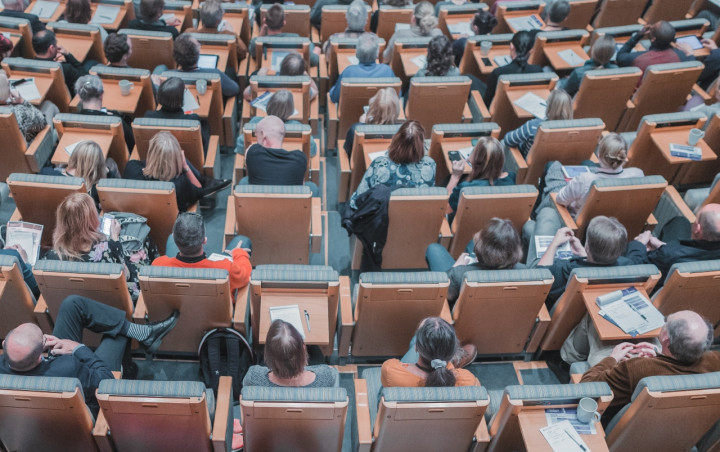Education and Science
Ensure free education with a focus on digital skills, literacy and Europe.

Slovenia's school system is among the best in Europe and the share of the population with a completed tertiary education has increased by 7.5% since 2011 reaching 25% in 2021. However, there is room for improvement, especially in the areas of digitisation, civic education and more accessible kindergartens.
Furthermore, Slovenia still ranks 10th among EU member states in the 2022 PISA ranking, but the share of pupils underachieving in all disciplines (maths, reading and science) increased from 16% to 26% compared to 2018 with especially boys and children from disadvantaged backgrounds falling behind in STEM topics.
With regards to research, Slovenia is only average in innovation capacity. This matches our R&D expenditures which are currently at 2.1% of GDP compared to the EU average of 2.25% (Sweden is leading with 3.57% of GDP).Volt Slovenija proposes:
Preschool and School
Subsidize childcare and kindergarten depending on household income to ensure both parents can work.
Revise learning material at least in 7 year cycles to ensure our education prepares children for a changing world.
Evolve curricula towards alignment with European schools to favour an education aimed toward European integration.
Introduce digital and media literacy in primary schools following the Austrian model. Students should learn, among other things, about the safe use of social networks, AI and the use of the internet as a tool for learning.
Ensure that financial literacy is included in the curriculum to increase awareness for cost of living and create the ability to manage one's finances.
Integrate computer science and basic programming into subjects where appropriate (eg. maths/physics) to familiarise students with the underlying technologies.
Extend the Active Citizenship programme to the first and second years of upper secondary school, and introduce it in other secondary schools.Academic education
Prepare students for a European job market by ensuring proficiency of at least two foreign languages.
Encourage and support professional exchanges as well as more cooperation between universities and the private sector in Slovenia and abroad to fast-track students towards future employment opportunities.
Validate quality of lectures and integration of current levels of academic research to over time build a reputation of Slovenia a European leader in the academic sector.
Attract international talent by expanding university and high school programs in English and other languages to attract more foreign students and build a diverse and skilled talent pool, while requiring the core curriculum to continue to be available in Slovene
Academic Education
Prepare students for a European job market by ensuring proficiency of at least two foreign languages.
Encourage and support professional exchanges as well as more cooperation between universities and the private sector in Slovenia and abroad to fast-track students towards future employment opportunities.
Validate quality of lectures and integration of current levels of academic research to over time build a reputation of Slovenia a European leader in the academic sector.
Attract international talent by expanding university and high school programs in English and other languages to attract more foreign students and build a diverse and skilled talent pool, while requiring the core curriculum to continue to be available in Slovene.
Encourage entrepreneurship by not waiving student benefits if a student creates his own startup and generates sales for the stated business purpose.
Science and Research
Increase science spending as a share of GDP (currently at 2,1% (EU average 2,3%, Austria 3,3%, South Korea 4,9%), both by creating more favorable conditions for private sector investments as well as public ones for basic research.
Conduct a feasibility study of bringing universities and research institutions closer together under a joint umbrella to increase our research ranking and access to public funds.
Evaluate options to make free access to paid scientific journals currently available via CTK (Centralna Tehniška Knjižnica, 8142 publications in 2023) accessible to the general public.
Promote open access journal publishing further by lowering the threshold to requiring scientific studies to be made available in open access journals from 50% of public funding to 25%.
Build a pipeline programme for accompanying innovative research to reach commercial readiness including means of acquiring public and private seed funding and support.
Define priority research areas closely tied to the ECR.
Begin building up an ECR-type national grant scheme similar to the Dutch “The Talent Scheme” and German “Emmy Noether” which give 1-3M Euro for 3-5 years to world leading scientists in the areas deemed important to Slovenia to attract and retain long term foreign researchers to Slovenia.
Include a quota for foreign researchers in the grant scheme and evaluate scientific merit and contributions on a 3 year basis.
Waive the possibility for research institutions to disregard academic tenure obtained abroad at accredited institutions within the European Union, the United Kingdom, the United States, Japan, and China.
Lifelong learning
Ensure accessibility to the Slovenian language courses by supporting the translation of educational platforms and applications (such as Duolingo) into Slovenian and promoting initiatives such as slonline.si.
Invest in improving digital literacy and language proficiency across the whole population, special focus on the elderly and disadvantaged to reach at least the EU average in digital literacy and close the gap to leading ICT nations.
(v4 11-2025)